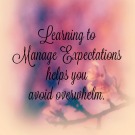What’s the first thing you do when you get up in the morning? Do you check your phone, mentally review your to-do list, or jump in the shower and just try to wake up?
What would happen if you instead took a few moments to set an intention? This doesn’t mean committing to certain “things,” but instead, it means forming an approach. And by approach, I mean, what types of feelings do you want to have throughout your day? What can you think, do, and speak that will help you have these feelings?
With this in mind, here are some example intentions:
• My intention today is to notice how nature is coming to life around me
• My intention is to notice how I’m triggered by a difficult coworker and how I can remain patient and kind to this person
• I choose not to engage in office gossip today
• I choose to approach a challenging work project with patience and an open mind
Using the examples above, make sure to keep your intention simple and use the following three tips to help you.
Attention follows intention
One of the best ways to start living with intention is to commit to noticing. Your intention may be to notice where you can freely help others without expecting anything in return. This could be as simple as letting someone go ahead of you in traffic, holding the elevator as someone rushes in the door of your office building, or literally stopping to check out the flowers that are starting to pop their heads up through the ground. Setting an intention is your small commitment to noticing more about yourself, who you are in the world, and most importantly, how you want to experience and approach life in every moment.
Intention guides choices
Living with intention is a choice. It’s a choice you make moment to moment, hour to hour, and day to day. By setting your intention for the day, you’re asking yourself to choose: choose your actions, choose your thoughts, choose how you respond to your experiences. You’re asking yourself to become aware of something, focus on feelings around that something, and then speak and act in ways that reflect that intention.
When the words and the deeds match, then you have integrity
Setting an intention will let you know loud and clear where you’re living with integrity and where you’re not. Choosing your actions and noticing them can be either a validation of this integrity or a wake-up call that you may need to start making some new and different choices. Remember, if you find yourself struggling with an intention you’ve set, please don’t feel bad or beat yourself up. Instead, look at what you’re struggling with and view that moment as a chance to make a different choice, and go in a more positive direction.
Intention takes persistence
Living with intention takes patience. It also takes persistence. This is why it’s so important to set your intention as an approach rather than a mandate to accomplish a goal. An approach is 100% under your control, much like your responses. A goal can be derailed by all kinds of issues and is not 100% under your control. But even knowing that you can control your approach, there may be times when you feel as though you’ve failed, and sometimes epically failed. When this happens, just hit the reset button. Take your failure (and it’s really not a failure, it’s a success because you just discovered an area where you need to grow and learn more about yourself) as a lesson, be kind to yourself, and use it as a way to learn more about what may have caused you to not use the approach you intended. Most of all, remember that living with intention is a practice, there will never be a perfect, and how you move forward after you’ve run off track is the part that matters.
There is an “I” in intention just as there is an “I” in integrity and both of those “I”s start with you. By setting an intention based on feelings and an approach, you can think, speak, and act in ways that literally allow your words and deeds to match. So as you set your intentions each day or week, ask yourself how you want to feel, where you want to go, and how you can get there with kindness toward yourself and toward others.






